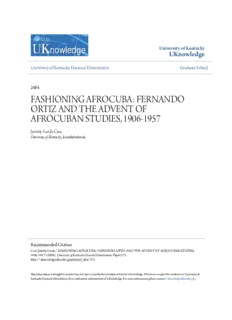
fernando ortiz and the advent of afrocuban studies, 1906-1957 PDF
Preview fernando ortiz and the advent of afrocuban studies, 1906-1957
UUnniivveerrssiittyy ooff KKeennttuucckkyy UUKKnnoowwlleeddggee University of Kentucky Doctoral Dissertations Graduate School 2004 FFAASSHHIIOONNIINNGG AAFFRROOCCUUBBAA:: FFEERRNNAANNDDOO OORRTTIIZZ AANNDD TTHHEE AADDVVEENNTT OOFF AAFFRROOCCUUBBAANN SSTTUUDDIIEESS,, 11990066--11995577 Jeremy Leeds Cass University of Kentucky, [email protected] RRiigghhtt cclliicckk ttoo ooppeenn aa ffeeeeddbbaacckk ffoorrmm iinn aa nneeww ttaabb ttoo lleett uuss kknnooww hhooww tthhiiss ddooccuummeenntt bbeenneefifittss yyoouu.. RReeccoommmmeennddeedd CCiittaattiioonn Cass, Jeremy Leeds, "FASHIONING AFROCUBA: FERNANDO ORTIZ AND THE ADVENT OF AFROCUBAN STUDIES, 1906-1957" (2004). University of Kentucky Doctoral Dissertations. 375. https://uknowledge.uky.edu/gradschool_diss/375 This Dissertation is brought to you for free and open access by the Graduate School at UKnowledge. It has been accepted for inclusion in University of Kentucky Doctoral Dissertations by an authorized administrator of UKnowledge. For more information, please contact [email protected]. ABSTRACT OF DISSERTATION Jeremy Leeds Cass The Graduate School University of Kentucky 2004 FASHIONING AFROCUBA: FERNANDO ORTIZ AND THE ADVENT OF AFROCUBAN STUDIES, 1906-1957 _________________________________________ ABSTRACT OF DISSERTATION _________________________________________ A dissertation submitted in partial fulfillment of the requirements for the degree of Doctor of Philosophy in the College of Arts and Sciences at the University of Kentucky By Jeremy Leeds Cass Lexington, Kentucky Director: Dr. Enrico Mario Santí, William T. Bryan Professor of Hispanic Studies Lexington, Kentucky 2004 Copyright © Jeremy Leeds Cass 2004 ABSTRACT OF DISSERTATION FASHIONING AFROCUBA: FERNANDO ORTIZ AND THE ADVENT OF AFROCUBAN STUDIES, 1906-1957 This study attempts to organize the conglomerate of writing on Africans within Republican Cuba. Starting with an examination of the scientific stages of such writing, we will trace the assorted work of Fernando Ortiz (1881-1969), whose anthropological study of Afrocuba produced myriad readings of the heritage. The multiplicity of renderings of Cuba s Africans from the scientific arena including condemning, racially charged treatises and spiritual conceptualizations of the richness of Cuba s African heritage generated an air of inconstancy. Indeed, the contradictions generated by the discipline s scientific course were incredibly polarized, representative of an ambiguity that became emblematic of Afrocuban Studies. Regardless of such blatant ideological opposition, tracing Ortiz s anthropological reading of the place of Cuba s Africans among the nation provides a telling insight into the racialized circumstances surrounding Republican nation-building. Whether scientific research scorned Cuba s Africans or applauded their inclusion in the national imaginary, Ortiz s writing and his invitations to Cuba s younger scholars to partake of folk study outlines a succinct treatment of Cuban nation-building between 1902 and 1959. If scientific research on Afrocuba promulgated studies that both cherished and demonized Cuba s Africanness, so too did Afrocuba s artistic invocations bear contradiction. After the vogue of the African swept the 1920s Parisian art scene, Africanized artistic currents infiltrated Cuba and mingled with its scientific counterpart. The ensuing readings of Afrocuba, contradictory and complex, spurred both research-art overlaps and the rejection of scientific tenets for a so-called artistically authentic rendering of Afrocuba that is, a reading from the inside, from within Afrocuba. It is along these lines that fiction writers (including Alejo Carpentier, Lydia Cabrera, and Rómulo Lachatañeré) posted renderings of Afrocuba that partook of various degrees of science, research, and artistic vogue. The resultant narrative system portrayed three different sorts of Afrocuban literature; none of the writers aligned succinctly in their portrayal. Afrocuba s poetic front was even more varied in its evocation of the nation, the academy, and popular art. In this way, Nicolás Guillén, Ramón Guirao, Juan Marinello, and Emilio Ballagas encapsulated unique poetic visions on two fronts: through offerings to Afrocuban poetics and through essays on the Afrocuban poetic mode. We shall examine such pieces in the hopes of understanding the balanced interplay that academic research and artistic invocation absorbed in the nation-building process, in the fashioning of Afrocuba. KEYWORDS: Fernando Ortiz, Afrocuban Studies, Afrocuban Literature, Cuban Literature, Los negros brujos ________________________________ ________________________________ FASHIONING AFROCUBA: FERNANDO ORTIZ AND THE ADVENT OF AFROCUBAN STUDIES, 1906-1957 By Jeremy Leeds Cass ________________________________ Director of Dissertation ________________________________ Director of Graduate Studies ________________________________ RULES FOR THE USE OF DISSERTATIONS Unpublished dissertations submitted for the Doctor s degree and deposited in the University of Kentucky Library are as a rule open for inspection, but are to be used only with due regard to the rights of the authors. Bibliographical references may be noted, but quotations or summaries of parts may be published only with the permission of the author, and with the usual scholarly acknowledgements. Extensive copying or publication of the dissertation in whole or in part also requires the consent of the Dean of the Graduate School of the University of Kentucky. A library that borrows this dissertation for use by its patrons is expected to secure the signature of each user. Name Date DISSERTATION Jeremy Leeds Cass The Graduate School University of Kentucky 2004 FASHIONING AFROCUBA: FERNANDO ORTIZ AND THE ADVENT OF AFROCUBAN STUDIES, 1906-1957 _________________________________________ DISSERTATION _________________________________________ A dissertation submitted in partial fulfillment of the requirements for the degree of Doctor of Philosophy in the College of Arts and Sciences at the University of Kentucky By Jeremy Leeds Cass Lexington, Kentucky Director: Dr. Enrico Mario Santí, William T. Bryan Professor of Hispanic Studies Lexington, Kentucky 2004 Copyright © Jeremy Leeds Cass 2004 To Anna
Description: